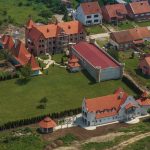“I feel at home in Split; my family and friends are here. Split is a beautiful city near beautiful islands, surrounded by natural beauty, good restaurants, and rich cultural and historical heritage. I like to wander around Diocletian’s Palace, to feel the history and architecture for a moment. Split is truly unique.”
With these words, Dr. John Rogošić tells Slobodna Dalmacija why he chose Split and a project that will come to life this fall. The Split International School will open its doors, opening new educational opportunities in the 2021/2022 school year for primary school children, both local and foreign, who chose Split as a destination for similar reasons as John Rogošić.
John Rogošić was born in New York. His father lived in Dugopolje before moving to the USA, where his parents met.
Dr. John Rogošić completed his early education in New York and his graduate and doctoral studies at MIT (Massachusetts Institute of Technology) in Boston.
“My main scientific research was in the field of electrochemistry, and I also had several smaller projects in the field of biology and mechanics. In addition to lecturing in college, I spent some time doing online education at edX. When I moved to San Francisco, I taught chemistry, biology, and robotics in high school,” he said about his work in America.
He also says that he moved away from teaching for a while when he was a co-founder of a technology startup, which was short-lived.
“I quickly returned to class after realizing how much I enjoy working with students. I sincerely believe that education is my true calling,” he points out, adding that he has focused mainly on founding a new school since coming to Croatia. Still, he has cooperated with the Split-Dalmatia County Center of Excellence to plan interesting new educational projects.
When asked about why he returned to Croatia, Rogošić said that they always visited during the summer months as a family, and when he grew older, he came even more often. When he arrived in Croatia in April 2020 during the coronavirus pandemic, he made an important life decision.
“I am closely connected with friends and relatives I have here. And like many other people, the pandemic prompted me to stop and think. I realized that I feel at home in Croatia. When I decided to stay here, I did not have a plan, I just felt that I wanted to spend the second half of my life here, and I am delighted that I made that decision,” says Rogošić with satisfaction.
The international school’s opening was prompted by a conversation with a Croatian-American couple he met last summer.
“They decided to return to Croatia as well, but none of their children knew the Croatian language at a level that would suit their education. Although international schools were available to them in Zagreb, they wanted to live in Split, not Zagreb. When we saw no suitable option for their family in Split, we decided to work on it together; we formed a small team to start this project. We have been working together for about six months, and we are happy with the decision to establish this school,” he said.
Meanwhile, their team has grown, joined by three other parents engaged in the successful launch of the new primary school.
Rogošić also points out that they have a five-member advisory board, which has a key role in leading and supporting all logistical, financial, and business aspects of this project.
“During the next few months, the teaching staff will join us, and thus we will finalize our team for the first year,” Rogošić revealed.
What have been their biggest challenges so far?
“We are still very active in this project, as in the past six months. Although there were a few unexpected challenges and perhaps a few cultural differences that we needed to overcome, we managed to overcome all the challenges and believe we will open the school this fall. I must point out that the people we met on this journey have provided us with incredible support and help. I want to take this opportunity to thank everyone who gave us advice and dedicated their time to bring our project to life,” he said.
Rogošić explains that the new school is intended for primary education and is based on the “International Bachelorette” (IB) program. This program has three levels – for both primary and secondary school and the “Diploma” program for advanced students. The IB program was launched in 1968 and is recognized in 158 countries in more than 5,400 schools worldwide, including Croatia. The umbrella organization is the International Baccalaureate Organization (IBO), which ensures that every school in education offers high standards, emphasizing a high level of knowledge and personal development of students.
“The IB program has been offered in Croatia since 1991. There are three authorized schools in Zagreb and one in Varaždin, and every year a small number of Croatian and international students complete the IB program. There are currently no IB schools in Dalmatia, so we think we will be the first to offer an IB program, but hopefully not the last. We hope that more schools here will provide the IB program,” John Rogošić says.
Classes will be held in English. Dr. Rogošić explains that the IB program can be held in English, French, or Spanish, but most often in English, which, as he emphasizes, is quite understandable given the families’ needs.
“Of course, students will learn the Croatian language through one of the subjects to adapt more easily to life here and to be able to communicate more easily with the local community,” says Rogošić.
It would also be expected that the school is located in a separate building, but Dr. Rogošić says that they are opening their school in a non-traditional way. Initially, the focus is on the upper grades of primary school (6th, 7th, 8th) because many families with children in that age group have shown interest in this international school.
This makes sense because it would be more difficult for older children who do not have a basic knowledge of the Croatian language in a class school. We also hope to organize classes for first and maybe second grade next year if there are interested families. We are currently looking to locate in the Manuš district and expect to have about 15-20 students in total during our first year of operation. In the future, we hope to move to a campus-style space, somewhere outside the city, but we can expect that only in a few years,” says John Rogošić.
As far as recruitment is concerned, teaching staff vacancies are still in the process. The school’s founder says that they have several promising candidates, but there are also several open positions.
“We expect to find the necessary teaching staff this spring so that each of our teachers completes the required training program for the IB program on time, which we will start this fall,” says Rogošić.
Split is a destination for a growing number of foreigners who are developing their business here.
“Many families move to Split, either for business reasons, lifestyle, or some other personal reasons. In many cases, families want to move to Croatia, but only for a few years and then return to their countries or try to find a new place to live. Often their children do not know the Croatian language well, and changing the education system can be difficult.
One of the IB system’s main advantages is that the program is offered in 158 countries around the world, making it easier for families to move from one country to another without interrupting their children’s education. This is one of the main advantages of this project, and that is why I think that having an IB school in Split is very important to help these families,” emphasizes Rogošić.
Students of Split International School will have the opportunity to participate in the program “FIRST Robotics,” in which they acquire knowledge in robotics. The goal is to inspire them to be scientific and technological leaders and innovators.
It should also be noted that the Harkness method is used in teaching, which allows students to work in small classrooms, but in a group environment, where their interaction and the development of the ability to think and reason is expressed.
To read more about lifestyle in Croatia, follow TCN’s dedicated page.








